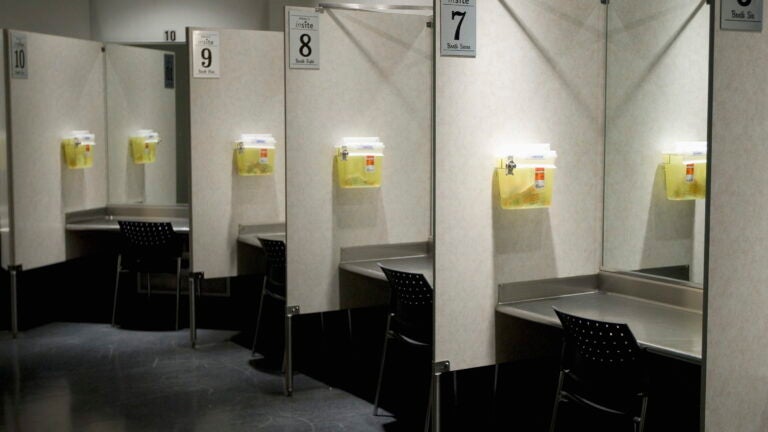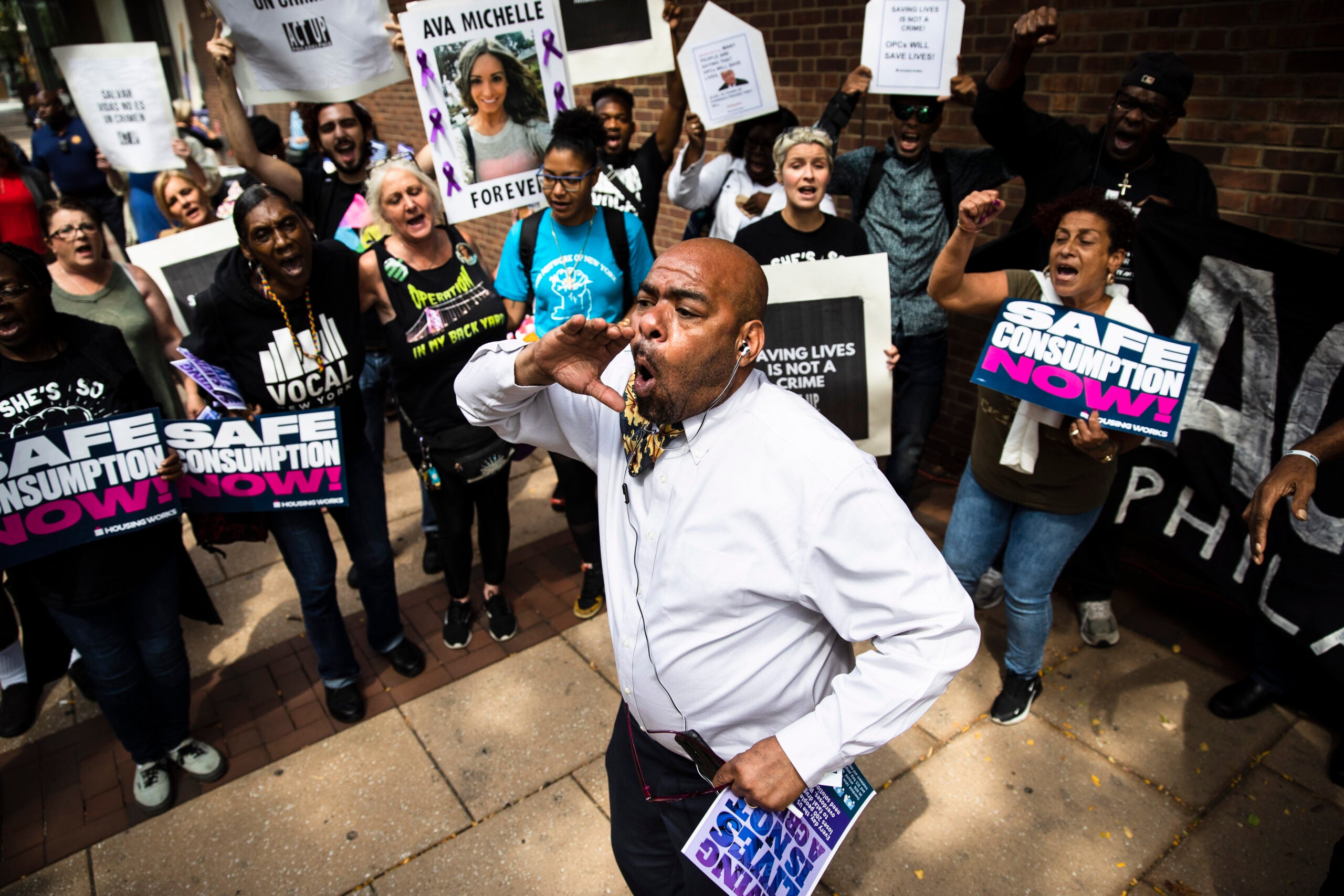"This is not a pro-drug site, it’s an anti-death site."

Though supervised consumption sites — a safe, clean space where people can use illicit drugs — are not explicitly legal, Somerville is forging ahead on the work to open one within city limits. To everyone involved, it comes down to one thing: saving lives.
For Somerville City Councilors Jesse Clingan and Matt McLaughlin, the fight is personal. Both are city natives and have childhood friends who have died from overdoses.
“I’ve known many friends who have passed away. They’ve died in bathrooms, in public parks, in snow piles, in the middle of the street,” McLaughlin told Boston.com. “They died in what I’d refer to as unsafe consumption sites, places where there is no protection or medical assistance to ensure someone doesn’t die. …This plan is not a pro-drug site. It’s an anti-death site. What we’re trying to do is save lives, and studies show that no one has ever died of a drug overdose at a safe consumption site.”
Clingan told Boston.com he’s tired of losing friends and family when those deaths can be prevented.
“To people that say this is encouraging use…ultimately this isn’t people getting high, this is people getting straight,” he said. “To those people I say, ‘this is going to happen no matter what, would you rather it be in a medical, supervised facility or would you rather your kid is trying to go to the bathroom and someone overdoses in the next stall over?’”
Worth the legal fight
One major challenge is, of course, that supervised consumption sites are not expressly legal in the United States. Gov. Charlie Baker remains opposed, and an effort to create one in Philadelphia was challenged by a former Pennsylvania U.S. Attorney and ruled illegal by an appeals court judge.
Though Somerville Mayor Joe Curtatone announced his intention to host a supervised consumption site years ago, the city is currently ramping up community engagement efforts, motivated by increasing opioid-related deaths and encouraged by a new federal administration. On June 10, the city shared the results of a commissioned “Needs Assessment and Feasibility” report on a site in Somerville, and the city will host three community meetings in July.
According to the report, opioid-related deaths in Somerville increased more than fivefold between 2012 and 2018, and in 2020 2,104 people in Massachusetts died from an opioid-related overdose. At the heart of the report is data from Australian and Canadian supervised consumption facilities, showing zero overdose deaths and decreasing neighborhood crime rates. For these and many other reasons, Curtatone told Boston.com he wants to take on this fight.
“We’d argue that they’re not illegal, and we’re prepared to take on that challenge,” he said. “We’re fully aware of what’s happening in cases that have been challenged, like in Philadelphia…they argued the application of the crack house statute to this, which many experts agree is inapplicable here. We’ll be fully prepared to argue and defend our strategy and this approach and the right of people to stay alive…in the right forum.”

Curtatone said the new federal administration makes him hopeful that their effort will succeed and that a new U.S. attorney will apply the law “prudently” and “compassionately.”
“We’ve seen our share of loss as a result of overdose here in Somerville,” he said. “To me…this is not about a legal argument, this is do we value human life and are we willing to apply proven methods that are effective, that not only prevent loss but act as…a proven method of harm reduction.”
Carl Sciortino, executive vice president of external relations at Fenway Health and a member of Somerville’s working group on the issue, told Boston.com they have been working to inform the analysis going on in Somerville and understand the legal and legislative landscape the city is working within.
“That whole realm of potential barriers is something to be mindful of but not something to let impede the work, or to be an excuse to not move forward,” he said. “Mayor Curtatone has recognized that literally everyday lives are at stake, and we need to figure out our path forward.”
The group is advocating for legislation to create a legal framework under state law, which Sciortino said is largely modeled on the legislation used to enact syringe exchange programs in the 90s at the height of the AIDS crisis.
“Syringe exchange, when it was introduced in the early 90s, was considered to be radical, was considered by many to be enabling drug activity, was considered to be illegal,” he said, “but it was an essential tool to address the AIDS crisis, and was significantly effective.”
Reducing harm, saving lives
Dr. Alexander Walley, director of Boston Medical Center’s Grayken Addiction Fellowship Program, told Boston.com that fentanyl is the leading cause of overdose in Massachusetts right now. Because it’s short-acting and usually injected, he said, HIV cases are also surging, making programs that address drug safety, such as needle exchanges and safe injection sites, absolutely critical.
“That’s why now we need to really think about supervised injection facilities,” he said. “No matter what we do, people are still going to be using fentanyl right now. No matter how much you do, people need a safe place where they can be observed and naloxone is present, that’s the only way to really protect them 100% from an overdose, short of getting people to stop using altogether which is something we are also trying to do, but we can’t rely on abstinence alone, that’s going to leave a lot of people out.”

Everyone agreed that supervised consumption sites are an important strategy, but they also noted that community buy-in is key.
“That includes local businesses understanding they have to accept there are people in their communities that use drugs and they have to buy into the fact that their lives are worth saving,” Walley said. “To really make it successful, you need to have an engaged voice from the people who are going to actually use them. You want to make it welcoming, you want people to come in and use it and feel comfortable there, and it needs to be dignified.
At the end of the day, though, Clingan said this is about saving lives and preventing preventable deaths.
“We’ve all heard the sanitized stories of: Johnny gets a broken leg playing hockey, he ends up on opiates, he ends up dying, and there’s certain sympathy for that,” he said. “Ultimately, you have people who are street active users who are houseless…but then you have a whole population of people who are functional users, who may be caught up in this disease and they can’t get out, and they have to score drugs on the street and those drugs are very dangerous.”
Supervised consumption sites, Clingan said, can be the difference not only between life and death, but compassion and apathy.
“They provide a warm touch, and that oftentimes can be the determining factor for somebody to remember and realize there is a kind world out there, and that are good people who don’t just view them as a junky,” he said. “That oftentimes is what they need to get them into treatment. This isn’t necessarily a scheme to get people to treatment, but that option should be there for those people who use for when people are ready; there’s a small window, and it closes fast.”
Newsletter Signup
Stay up to date on all the latest news from Boston.com
"consumption" - Google News
July 09, 2021 at 11:43AM
https://ift.tt/3hLG6Xs
Here’s why Somerville wants to host the first US safe consumption site - Boston.com
"consumption" - Google News
https://ift.tt/2WkKCBC
https://ift.tt/2YCP29R
Bagikan Berita Ini














0 Response to "Here’s why Somerville wants to host the first US safe consumption site - Boston.com"
Post a Comment